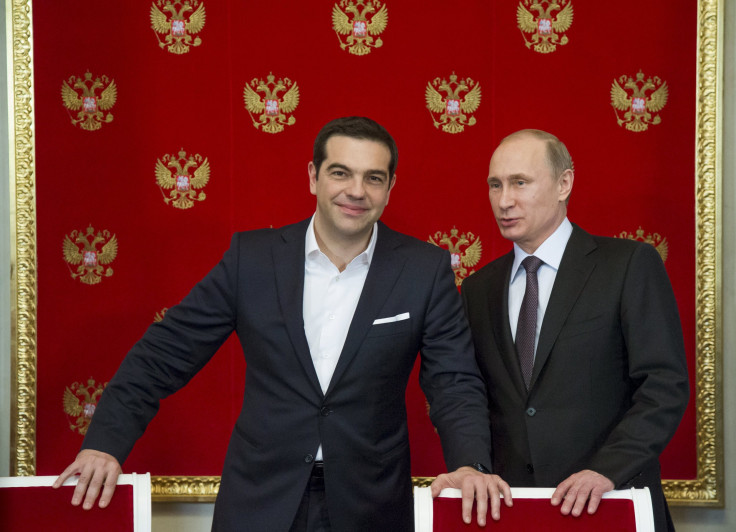Greek Prime Minster's Moscow Visit Angers Leaders Of Former Soviet Satellite States

Greek Prime Minister Alexis Tsipras' visit to Moscow this week, which saw him received by Russian President Vladimir Putin, has raised the hackles of some of the country's EU partners, particularly states that were once under the control of the former Soviet Union.
Lithuanian Prime Minister Algirdas Butkevicius branded the meeting “utterly incomprehensible,” the Irish Independent reported.
During his two-day visit to Moscow, Tsipras told Russian state news agencies that the country had blocked broader EU sanctions against Russia for its role in the conflict in Ukraine. “We used the small force we have to help avoid further sectoral sanctions,” said Tsipras, in comments cited by the Wall Street Journal. “You probably know that the position of the new Greek government is that sanctions don’t lead anywhere, they’re a dead end.”
Latvian Prime Minister Laimdota Straujuma branded these comments a “surprise,” saying Greece's position would not affect the European consensus. Both Lithuania and Latvia were former Soviet satellite states.
In addition, Spanish Foreign Minister Jose Manuel Garcia-Margallo spoke out against Tsipras comments on Russian sanctions, telling the EU Observer: “I can't share the opinion of the Greek prime minister. ... Once international law is re-established [in Ukraine], the time will come to look for a formula to end this state of latent tension between Russia and the European Union.”
Experts, however, saw Greece's embrace of Moscow as little more than a negotiating tactic. “The Greeks are using Russia as a way to piss off Berlin, to frighten them. Tsipras wants to show he has other options,” Theocharis Grigoriadis, a Greece-Russia relations expert at the Free University of Berlin, told the Financial Times.
“But he has no intention of making Greece a Russian satellite. The Russians know that. The Germans know that. It is pure theatre, a Greek game, and I’m afraid it looks like a poodle trying to scare a lion.”
The Economist magazine branded Tsipras' visit to Moscow as an example of “gesture politics,” which was likely aimed at shoring up support from some former communist party members of his coalition government, who have been critical of its handling of negotiations with international creditors.
The Greek prime minister's visit to Moscow was not the only action it took to stir up tension with its EU creditors. The country ratcheted up pressure on Germany, in its ongoing pursuit of reparations for the Nazi occupation of Greece during World War II.
The country's defense ministry published a video Friday, featuring rare footage filmed during the Nazi occupation of Greece. The film (which can be viewed here, and features disturbing scenes) shows children suffering from malnutrition and emaciated adults, a situation it says was caused by a loan Greece was forced to give the Nazi regime.
On Tuesday, Greece demanded 278.7 billion euros ($303 billion) in war reparations from Germany, a request the German economy minister branded as "stupid," the Guardian reported.
Greece is hoping to reach a deal with creditors to unlock 7.2 billion euros ($7.8 billion) in bailout funding, which it needs to avoid default on future loan obligations.
© Copyright IBTimes 2024. All rights reserved.





















